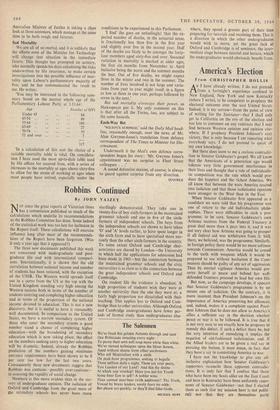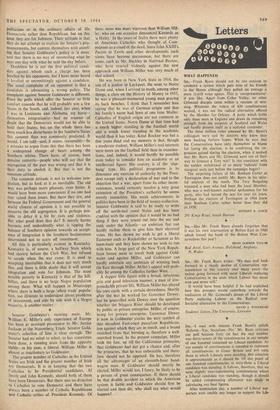America's Election
From CHRISTOPHER HOLLIS
As I have already written, I do not pretend, from a fortnight's experience confined to New England, New York and now Kentucky (where I write), to be competent to prophesy the electoral outcome over the vast United States. Indeed, it is my sorrow—from the point of view of writing for the Spectator--that I shall only get to California on the eve of the election and too late to comment on any contrasts that I may find between Western opinion and opinion else- where. If I prophesy President Johnson's easy victory, that is only because I am repeating what everybody says. I do not pretend to speak of my own knowledge.
But there does seem to me a curious contradic- tion in Senator Goldwater's gospel. We all know that the Americans of a generation ago would tolerate very little government interference in their lives and thought that a rule of individualis- tic competition was the rule which would pro- duce the happiest and the richest America. We all know that between the wars America reacted into isolation and that those isolationist opinions were stronger in the West than in the East.
When Senator Goldwater first appeared as a candidate we were told that his programme was one of return to the old individualistic philo- sophies. There were difficulties in such a pro- gramme, to be sure. Senator Goldwater's own Arizona receives from the Federal Treasury a great deal more than it pays into it, and it was not very clear how Arizona was going to prosper if all federal aid was withdrawn from it. Still, there, we believed, was the programme. Similarly, in foreign policy there would be no more softness towards Communism. America would be armed to the teeth with weapons which it would be prepared to use without hesitation if the Com- munists should be guilty of any act of aggression. Thus by eternal vigilance America would pre- serve herself at peace and behind her well- defended frontiers proceed to lead her own life.
But now, as the campaign develops, it appears that Senator Goldwater's programme is by no means one of isolation. On the contrary,. it is more insistent than President Johnson's on the importance of America preserving her alliances, and, indeed, makes it a complaint against Presi- dent Johnson that he does not allow to America's allies a sufficient say in the decision whether peace or war is to be followed. It is true that it is not very easy to see exactly how he proposes to remedy this defect, if such a defect there be, but the very intention of remedying it implies the negation of old-fashioned isolationism, and, if the Allied leaders are to be given a real say in pressing the button, it must mean, in fact, that they have a say in committing America to war.
I have not the knowledge to give any all- inclusive explanation how Senator Goldwater's supporters reconcile these apparent contradic- tions. It is only fair that I confess that those who have been my hosts alike on the East Coast and here in Kentucky have been uniformly oppo- nents of Senator Goldwater—not that I elected them as such (for my mission here is not politi- cal) nor that they are themselves party
Politicians or in the ordinary affairs of life Democratic rather than Republican, but on this issue, they are for Johnson. Their attitude is that they do not attempt to explain the Senator's pro- nouncements, but content themselves with assert- ing that Senator Goldwater's policy is 'a mess' and that there is no way of reconciling what he says one day with what he said the day before.
Doubtless he is not the first political candi- date against whom such a charge has been levelled by his opponents, but I have never heard it levelled so unremittingly agliinst a candidate. The usual complaint of an opponent is that a candidate is advocating a wrong policy. The complaint against Senator Goldwater is different. Even the polls which offer the Senator so little comfort concede that he will probably win a few States in the South, and, indeed, last year, when I was in Louisiana and Alabama, my hosts— themselves integrationist—had no manner of doubt that the Democrats would not be able to hold their States; but on the whole there has been much less disturbance in the Southern States this summer than was commonly predicted. It would, I am told—and, it seems, reasonably—be a mistake to argue from this that there has been a widespread change of heart among the Southern whites. There have, of course, been genuine converts—people who will say that the segregation of the past was wrong and that it is their duty to abolish it. ' But that is not the common attitude.
The common attitude is not to welcome inte- gration, but to look at it as inevitable. The old Way was perhaps more pleasant, even better. It would have been more convenient if no one had ever raised these issues. But there they are, and between the Federal Government and the general world climate of opinion it is not possible to preserve the old segregation. It is perhaps pos- sible to delay it a bit by riots and violence. But what good does that do? It merely harms business and undoubtedly what is tipping the balance of Southern opinion towards an accept- ance of integration is the Southern businessman determined not to scare off investment.
All this is particularly evident in Kentucky. Kentucky is, of course, a halfway State which had slavery before the Civil War, but refused to secede when the war came. It is used to accepting inevitables that it does not very much like, and there is little doubt that it will accept integration and vote for Johnson. The most notable poverty in Kentucky is that of the hill- billies, and there is no large Negro population among them. What will happen in Mississippi where there is both a large 'white trash' popula- tion, too illiterate to understand about problems of investment, and side by side with it a Negro majority, is another matter.
Senator Goldwater's running mate, Mr. William E. Miller's only experience of Europe has been as' assistant prosecutor to Mr. Justice Jackson at the Nuremberg Trials. Senator Gold- water's selection of him is clear enough. The Senator had no mind to select, as has sometimes been done, a running mate from the opposite stable—in his case, a liberal. William Miller is almost as reactionary as Goldwater.
The greater number of Catholics in the United Stales are Irish and the greater number of Irish are Democrats. It is in keeping that the two Catholics to be Presidential candidates, Al Smith and John Kennedy, should both of them have been Democrats. But there was no direction to Catholics to vote Democrat and there have always been a number of Catholic Republicans and Catholic critics of President. Kennedy. Of
these, none was more vigorous than William Mil- ler, who on one occasion denounced Kennedy as 'a Hitler.' In the years of Stalin there were plenty of American Catholics who thought of Com- munism as a creed of the devil. Since John XXIII's Pacetn in Terris and other developments such views have become uncommon, but there are some, such as Mr. Buckley in National Review, who have reacted violently against the new approach and William, Miller was very much of that school.
He was born in New York State in 1914, the son of a janitor in Lockport. He went to Notre Dame and, when I arrived to teach, among other things, a class on the History of Money in 1935, he was a pleasant-mannered young man gracing its back benches. I think that I remember him saying that he was of German origin and that his family's name had been at one time Muller. Catholics of English origin are not common in the United States. Notre Dame at that time had a much higher standing in the football world and a much lower standing in the academic world than it has today. Knut Rockne was but a few years dead and my memory is that, though a moderate student, William Miller's real interests were more on the football field than in examina- tions, and, indeed, it would hardly be possible even today to consider him an academic or an intellectual figure. His oratory is of the 'slap- bang' type. His political programme is to denounce any exercise of authority by the Presi- dent except only a declaration of war and to the objection that a war, apart from its other incon- veniences, would certainly involve a very great extension of the President's authority he seems merely insensitive. His main achievements in politics have been in the field of money-collection. Senator Goldwater is said to be ready to write off the north-east coast States and has been credited with the opinion that it would be no bad thing if they were towed out into the 'sea and sunk under the Atlantic—an ambition, that can hardly incline them to give him their electoral votes. He has shown no wish to get a liberal Easterner such as Rockefeller or Scranton as his team-mate and they have shown no wish to run with him. A large part of the New York Repub- lican forces seem to revolt both against Gold- water and against Miller, and Goldwater can hardly entertain any ambitiOn of winning back the East through Miller. Miller's appeal will prob- ably be among the Catholics farther West. . A dapper little figure with a broad, infectious grin and good television manner, a man of irre- proachable private life, William Miller has played his own cards with a certain shrewdness. Shortly after the war he worked for Governor Dewey, but he quarrelled with Dewey over the question whether the Niagara River should be developed by public or private enterprise, Miller, of course, being for private enterprise. Governor Dewey is now in Goldwater circles the very symbol of that decadent East-coast pussyfoot Republican- ism against which they are in revolt, and a brand snatched from that burning is, therefore a well- snatched brand. In the present campaign, Miller took the line, up till the Californian primaries, that Goldwater had not got a chance and, after the primaries; that he was unbeatable and there- fore should not be opposed. He has, therefore all the advantages of an eleventh-hour band- wagon man. If Goldwater should merely be elected, Miller would not, I fancy, be likely to be a person of great consequence. If there should be that double accident to which the American system is liable and Goldwater should first be elected and then die, who shall say what would happen?



































 Previous page
Previous page